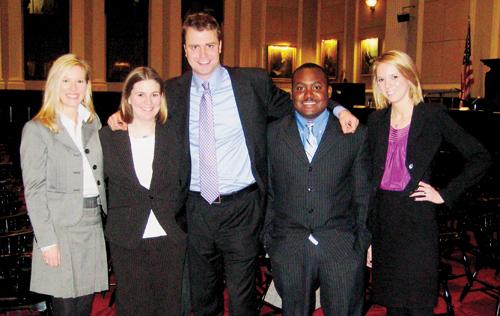EDITOR’S NOTE: In a previously published version of this story, The Maroon misstated the history of Loyola Law’s moot court team. We should have said that the team reached the nationals last year and many recent years prior to that. Also, the same article misstated the details of the competition. We should have said that the moot court team made it to the Final Four, and the competition does not designate a second, third or fourth place winner. Finally, the regional competition involved nine teams from Mississippi, Louisiana, Alabama and Tennessee. We regret these mistakes.
As unbelievable as it sounds, it was a coin toss that determined the fate of Loyola College of Law’s moot team at the national competition in New York City this year.
A coin toss is used to determine which side of an argument each competitor is on. Loyola Law made it to the final-four round and lost to the team from Chicago-Kent College of Law by three points.
“I think once you get to that level of competition, it’s not unusual for the winner to be decided by a coin toss,” said Richard Brown, one of two oralists on the moot team. Chris Otten was the second oralist. Katie May was the brief writer and Leigh Anne Gilchrist was the student coach. All are third year Loyola Law students.
In November of last year the moot team came in first at the Moot Court Regional Competition against nine other schools. This guaranteed them a shot at the nationals in New York last month.
The New York City Bar Association National Moot Court Competition pits two of the best moot teams from each of 14 regions against each other in two areas: a legal brief prepared prior to the competition and an oral argument. The legal brief, written by May, with research and advice from the two oralists, could count for up to 40 percent of the team’s score.
In the first of two rounds, Loyola oralists Brown and Otten had to bring out their most sound arguments in order to beat oralists from both University of Minnesota Law School and University of Kansas School of Law. They beat both teams.
“The first round was actually tougher competition,” said Otten. “After we got warmed up in the second round, we did a lot better.”
In the second round, Otten and Brown beat Kansas Law in a rematch by seven points. Then, in an upset, Loyola beat the team from Chicago Law School by ten points.
Monica Wallace, law professor and moot team advisor, called the win over Chicago “unprecedented.”
This propelled the Loyola moot team to the final four. Their first and last bout of the final four was with Chicago-Kent College of Law.
Chicago Law had beaten Chicago-Kent in their regional competition.
“They thought we were going all the way,” Brown said of the Chicago-Kent moot team.
The coin-toss determined whether Loyola Law would be on either the petitioner (plaintiff) or respondent (defendant).
The moot competition presented this issue to oralist Chris Otten: Does the state zoning commission have the right to prevent a church to expand in a zone which forbids it? The issue touches on a religious freedom debate that would be difficult for judges to remove from their deliberation.
Chicago-Kent, winning the coin toss, argued on behalf of the church.
Otten said both sides argued well, but the opposition, having the moral high ground (that the church ought to be allowed to expand) and more time than Loyola to speak because of judges’ easy-to-answer “softball questions,” won by three points.
“I think that by that time, the judges had already decided that she was going to get the benefit of their doubt,” Otten said.
“Once you get all of those softball questions from so many people on the bench, it’s hard to overcome that,” he said.
Despite their loss, the Loyola moot team said they’re proud of their achievement.
If any law students would like to test their salt against the country’s other young litigators, e-mail the moot team faculty advisor Monica Wallace at [email protected].
Jean Paul Arguello can be reached at [email protected].







